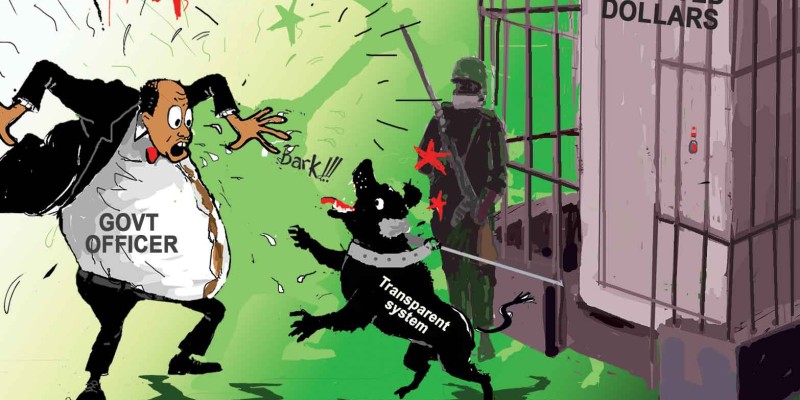Font size:
Print
DOLLAR ALLOCATIONS: A NEW DAWN
By: Late Sir Henry Olujimi Boyo (Les Leba), first published in February 2008
INTRO:
Following last week’s publication of late Sir Henry Olujimi Boyo’s article titled “Dollar Allocations: How the Forex market should operate” and an earlier article titled “The dividends of a liberalized foreign exchange market” which was also republished on the 11th of January 2021. It is apparent that the current state of our economy remains stagnant - especially when we take note of the timelines these articles were initially published. The matter at hand is of great concern for all Nigerians as the value of our currency or lack thereof, affects us all.
It is important to note that under a faulty monetary framework, our position will remain unaltered even if we diversify our potential revenues in relation to our exports.
On this note,let us take a look at today’s article sourced from the archives titled “Dollar Allocations: A New Dawn” by Late Sir Henry Olujimi Boyo, first published on the 4th of February 2008. Enjoy the read!
(These articles are also available on his web portal, www.betternaijanow.com.)
The recent decision by our Central Bank to refrain from changing the Dollar component of monthly distributable revenue to Naira before sharing to the tiers of government is a tacit admission that the erstwhile exalted monetary and economic blueprints, a la NEEDS, SEEDS, LEEDS, etc, were founded on a framework which was grossly defective and consequently failed to provide fertile ground for the improvement of the welfare of our people, and the successful development of industry and agriculture.
In last week’s article titled “DOLLAR ALLOCATIONS: HOW THE FOREX MARKET WILL OPERATE”, we advised on the appropriate modus operandi for successfully infusing the benefit of our export Dollar earnings into the economy. We insisted that the Dollar values remain in the custody of our CBN until final payment is made by the CBN to the accounts of providers of goods and services abroad, and we opposed the CBN suggestion to domicile the Dollar payments into the overseas correspondent bank accounts of designated Nigerian banks!
It is clear that the CBN’s proposed arrangement will only benefit the banks and encourage round tripping and other forms of financial malfeasance. In the end, corruption will thrive and the rest of us will be poorer while a small elite will continue to be corruptly obese!
It is my fervent prayer that once again, self-interest will be quickly put aside and good sense will prevail so that the greatest common good will be the objective of the CBN. In this event, both the constitutional beneficiaries and all registered (not CBN designated) commercial banks will maintain domiciliary accounts with the CBN to facilitate the settlement and accounting for the Dollar revenue disbursed monthly to the three-tiers of government. This arrangement will actually liberate the Nigerian economy within six-months, as an open economy, devoid of deliberate institutional distortions become prevalent, particularly in the foreign exchange market.
It is clear from all the various formulations that have been adopted by the CBN in arriving at trading rates for the national currency, the Naira, over the last 20 years, that the true market forces of demand and supply have taken the back seat as market exchange rate determinant. In every system practiced so far, the CBN has remained the sole provider to the market of over 85% of the total value of foreign exchange traded on the market! The forex market has, thus, taken on the toga of a controlled market for essential commodities where there is only one outlet and the results are the attendant price distortions, parasitic chain and economic dislocation.
“For example, the Naira was rated about N22 to a Dollar about 10 years ago, while our foreign reserves and revenue were much less than the current over $50bn. If we are truthful to ourselves, we have to admit that it is the framework for the disbursement of foreign exchange earnings that is the major problem and not the available amount and the current demand by the productive sector. The revelations of staggering wealth diverted into private foreign accounts underline the reality that demand for forex for economic use has not been the real villain in the foreign exchange treasury.”
“The Dollar has become a rarity, an essential commodity made so by the CBN’s hold on the key to our foreign exchange vaults and the CBN’s unilateral declaration of exchange rates based on a formula best known to itself but certainly devoid of a true market mechanism.”
“The CBN alone has cornered the supply side of the forex market and hence the price distortions and dislocations. The scenario would be different if the Dollar component of the federal revenue enters into a foreign exchange market through separate price negotiations between each constitutional beneficiary of the federal pool and their respective bankers!! This should be the foundation and framework for a truly liberalised foreign exchange market governed by the market forces of supply and demand.”
“The main dividend to be derived from the adoption of a liberalised foreign exchange market is the quick evolution of a realistically priced Naira that will infuse the positive multiplier effects inherent in a free-market economy dictated by the dynamics of demand and supply.”
“The CBN would emerge unencumbered by the distraction of forex hawking and intrigues, and assume its role as a patriotic custodian of the Naira and a nimble and effective policeman of the money market in line with national aspirations.”
“The mirage of excess liquidity whenever the federal pool is disbursed and the regressive reflex of mop-up activity inherent in the current system will disappear forever!!”
“The bulk of all foreign exchange earnings is expended in its original form (without any prior conversion into Naira to needlessly and vastly swell money supply) to pay for the nation’s total import needs.”
“Foreign exchange not required for domestic transactions by governments, public agencies and private sector operators will remain in the owner establishments’ domiciliary accounts with the CBN and will not be regarded as part of commercial banks’ liquidity base.”
The effect of tamed excess liquidity on the industrial sector will be as follows:
“Industrialists will obtain cheaper Dollars and consequently be able to bring in more raw materials and machinery with the same outlay as hitherto.”
“Prices of locally manufactured goods will fall; industrial capacity utilisation will improve; increased employment generating opportunities will evolve; disposable income will increase and overall demand will expand; demand for imported consumer goods will reduce as local manufacturers rise up to the challenge of filling the gap.
“The CBN’s Monetary Policy Rate needs not be excessively weighted upwards to mop up excess liquidity caused in the current system by the conversion of Dollar revenue to Naira before sharing to constitutional beneficiaries of the federation pool. Lower interest rates would stimulate investment and enhance employment and generate aggregate demand with other salutary benefits in tow!”
“Speculative demand for forex at any cost from the CBN will disappear as the CBN will no longer sell Dollars and any foreign exchange for that matter at a local bazaar! The erstwhile parasitic chain, round-tripping, excessive arbitrage income, Dollar hoarding, artificial scarcity and the search for Dollars at any cost will evaporate. Naira will be king and CBN will be well positioned to manage its good health! The parallel or black market will now provide less attraction and may be expected to gradually disappear.”
“The late and often inaccurate returns which characterise the current system will disappear and the CBN will have a fairly good picture of the state of the economy within a lag of no more than two days.”
“The CBN audit officers located in financial institutions will be expected to send correct returns of each institution’s transaction in forex activities as well as other financial transactions of interest to the CBN every day. Availability of such database would enhance the CBN’s ability to perform its statutory job of policing the banks to ensure that their operations are in line with policy, and our economy will witness a new dawn!”
Excerpts from "A LIBERALISED FOREIGN EXCHANGE MARKET: a proposal for a liberalised foreign exchange market in Nigeria and its economic benefits” BOYO/OJOMAIKRE (sections 3 – 4).”
SAVE THE NAIRA, SAVE NIGERIANS!









